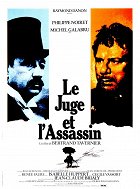Regie:
Bertrand TavernierKamera:
Pierre-William GlennMusik:
Philippe SardeBesetzung:
Philippe Noiret, Michel Galabru, Isabelle Huppert, Jean-Claude Brialy, Yves Robert, Gérard Jugnot, Christine Pascal, Jean-Roger Caussimon (mehr)Inhalte(1)
Frankreich, 1895: Der wegen Jähzorn aus der Armee entlassene Unteroffizier Bouvier wird nach gescheitertem Suizidversuch in eine Heilanstalt eingewiesen. Nach seiner Entlassung geschehen grausame Morde im ganzen Land. 1895 wird der sensible, aber jähzornige und ungehorsame Bouvier aus der Armee entlassen. Er kehrt zu seiner Angebeteten zurück, Louise will sich jedoch nicht mit ihm verloben. Es kommt zum Streit, Bouvier schießt auf sie und sich. Er überlebt, wird jedoch in eine Heilanstalt eingewiesen. Nach kurzer Zeit wird er entlassen – ein fataler Fehler: Bouvier zieht perspektivlos und mordend durchs Land. Zur selben Zeit verfolgt Provinzrichter Rousseau eine Serie von Morden an 12- bis 16-jährigen Jungen und Mädchen, die auf grausame Weise vergewaltigt und getötet wurden. Anhand des Phantombildes erkennt er Bouvier sofort, als dieser in die Gegend kommt. Es gelingt ihm, das Vertrauen von Bouvier zu erschleichen und ihm ein Geständnis abzuringen. Zugleich werden ihm die Ursachen der psychischen Probleme deutlich: Bouvier wurde selbst als Kind missbraucht. Als Bouvier ein umfassendes Geständnis ablegt, erregt der Fall großes öffentliches Interesse. Fortschrittliche Ärzte plädieren dafür, Bouvier als Geisteskranken zu internieren. Sie wollen den Fall erforschen und „einen neuen Bouvier“ verhindern. Doch davon will der fanatische Richter nichts wissen. In seinen Augen ist Bouvier von Grund auf böse, und so setzt er alles daran, ihn als voll zurechnungsfähigen Mörder unter das Fallbeil zu bringen. (arte)
(mehr)Kritiken (1)
In a number of comments, surprise, or rather criticism, appears about the final scene which supposedly changes the meaning of the entire film and turns a psychological drama into red propaganda in the last minutes. Unfortunately, these viewers either failed to understand the social context that Tavernier is attempting to convey or have deficiencies in their knowledge of French history. The film actually has a clear opinion from the beginning and Tavernier doesn't aim for psychological drama as much as socio-critical drama, using the case of an exposed serial killer to criticize the social conditions and take a stance against the hypocrisy and double standards of the so-called upper classes. From the beginning to the end, a left-wing perspective is clearly felt, discussing, for example, the so-called Dreyfus affair, which was one of the most fundamental clashes between the republican and internationalist left and elitist nationalist right, and which had a clear anti-Semitic nature. The film also clearly exhibits an anti-clerical tone, with a number of scenes that expose the church. From today's perspective, it is necessary to highlight above all the outstanding performance of Michel Galabru, who portrayed the mentally disturbed killer with incredible virtuosity. Philippe Noiret as a professional opportunist and manipulator was also good, but Galabru surpassed him by several levels this time. By the way, I also disliked the mentioned scene at the end, but only because it was unnecessarily straightforward. The same could have been conveyed through some type of dialogue between the film characters. However, I won't spoil the rating of this excellent two-hour film because of a two-minute slip-up. Overall impression: 90%.
()

